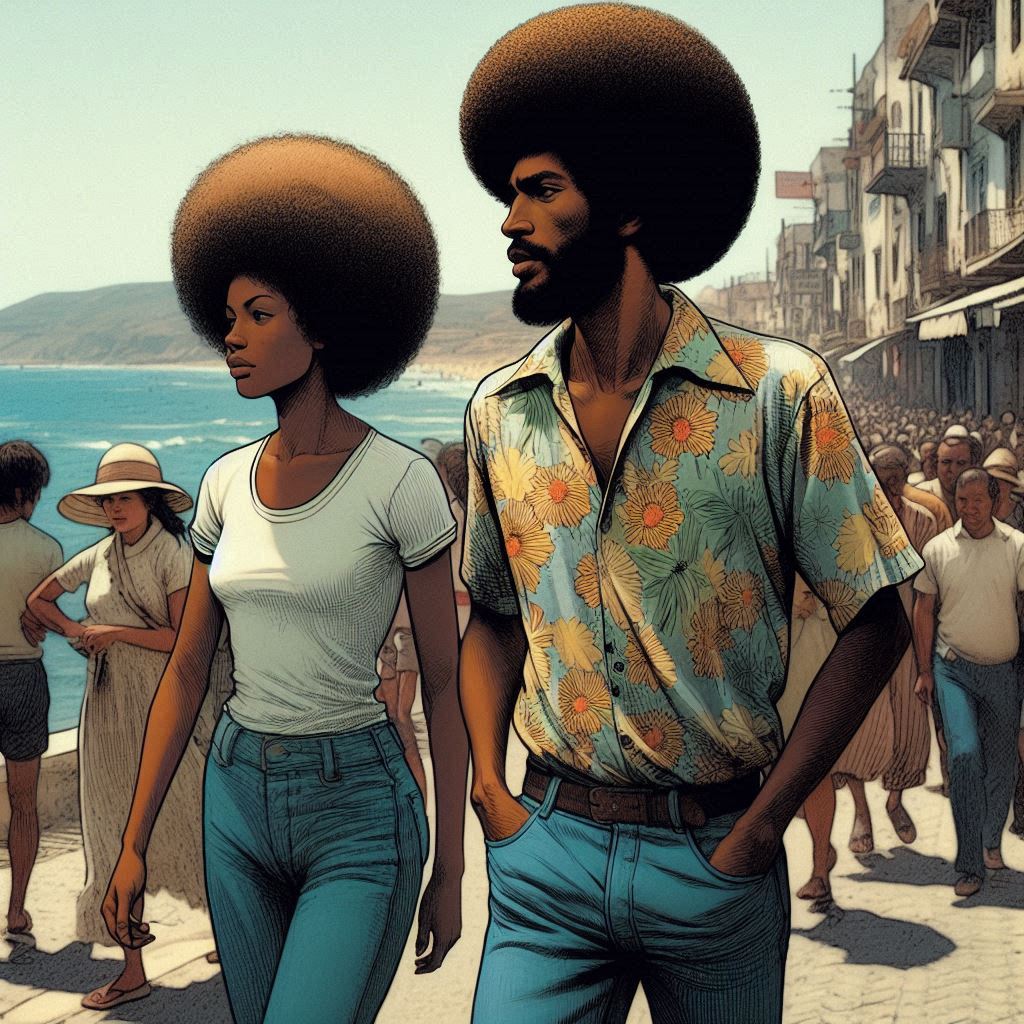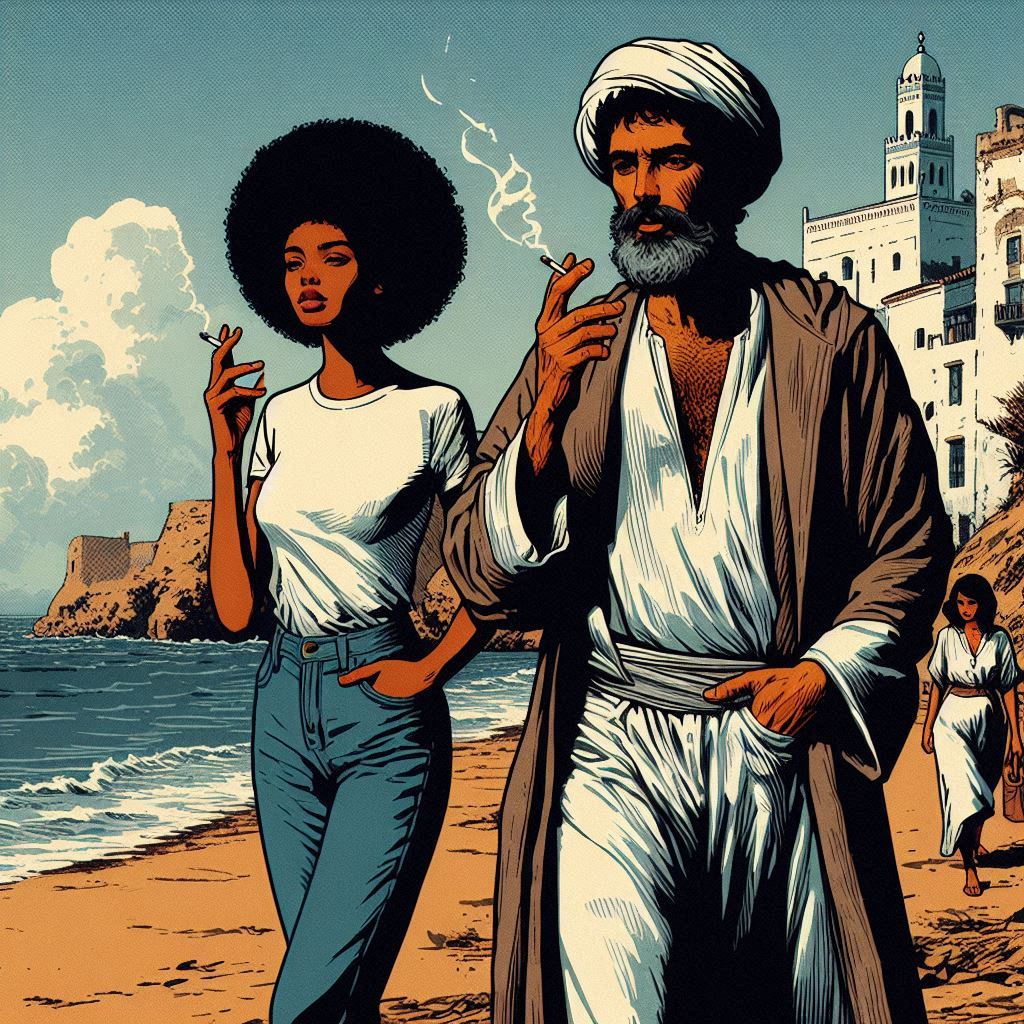Gorilla Republic: Deutschland: Part 26
15 April 2025

That morning, the dark Mercedes kicked up dust as it cruised into Central Tetouan and stopped at M'diq, where Makhlouf dropped them off before speeding away, back to his place.
“You know we are being watched, right?” Banou said.
Mapacha was surprised by her intuition. He also knew she was right.
“I expect so. But there is nothing to it.”
And right they were. A veiled woman, invisible to them and blending in effortlessly with the crowd, trailed them from a distance. At first, they wandered aimlessly, picked up a few mementos, and eventually made their way to the telephone bureau. Inside, Banou booked a call to Gwafa’s 'office' at the airport and prayed that he would be there. It was a long, agonising 20 minutes before the connection was made. Through the static and the clicks, she finally heard Gwafa’s voice.
“Ça va, Banou? How are you?”
“We’re good, Gwafa. Yourself?”
“I’m good. You guys done with the job?”
“Yeah, but we need some information. Qual é o preço do ouro hoje? (What is the price of gold today?)”
Gwafa fell silent. His Portuguese was dreadful, but he understood that if Banou was speaking in it, then there was a good reason, likely, the call was tapped.
“Ouro? (Gold?)” he asked cautiously.
“Yes.”
Another long silence followed. Almost 30 seconds.
“Call me back in half an hour. I will speak to someone and get you the most up-to-date prices, OK?”
“OK.”
The line went dead.
“Call the same number in 30 minutes,” Banou told the attendant.
She handed over a 100 dirham note before even hearing the charges. It was likely more than required, but she was in a generous mood. They left the bureau, crossed the road to a tea shop, and sat down for a quick cup while they waited. Makhlouf’s operator watched them from a nearby stall.
“So, when do we return home?” Banou asked.
“I’m hoping that if Makhlouf buys the gold today, then tomorrow night.”
He was tired of staying at Makhlouf’s and longed to return home. Half an hour later, Banou returned to the bureau.
“Banou?” came Gwafa’s eager voice.
“Yes.”
“38 dollars per ounce.”
“OK,” she replied, scribbling it down on a scrap of paper.
“Mapacha’s asking if we can get a ride tomorrow night?”
“Same place?”
“I think so. Unless the man says otherwise, we will confirm.”
“Confirm and let me know when you are ready. Do you have much luggage?”
“We picked up a few extra things, so we will need slightly bigger bags.”
“No problem. I will be waiting for your call.”
“OK.”

The line went dead once more. Banou set the receiver down. The attendant calculated the call charges and offered change from the 100 dirham note, but Banou declined. She slipped on her sunglasses, lit a cigarette, and casually crossed over to where Mapacha sat, surrounded by other patrons in the café. They wandered the town for the rest of the afternoon, had a lazy lunch, then rang Makhlouf to pick them up. By the time they returned to the house, dusk had settled. Mapacha, exhausted, retired to his apartment, while Banou and Makhlouf went for a walk on the beach.
“Makhlouf,” she began, “we have a problem, and you need to understand.”
He looked puzzled. The hound in him stirred. Was this about the phone call earlier? He had been informed, but not briefed on the context.
“Is there a problem with the money?”
Banou sighed.
“No, not that. It is about the two suitcases we brought when you picked us up.”
“There were three suitcases. I figured it was just your stuff.”
“The third has Mapacha’s things. That is not important. The other two. . . they had gold.” She paused. “They have gold.”
That caught his attention.
“Gold?”
“How much gold exactly?” he asked.
She hesitated, as if the words weighed something. Then she murmured, “100 kilos.”
He whistled, taken aback.
“100? Where did you get 100 kilos of gold from?”
“The German guy. It was in his house. Since the Yugoslav guys took him and did not seem interested in the stash, we figured it was an opportunity.”
“What Yugoslav guys?”
She realised they had never explained the full story. Banou spent the next 20 minutes giving him the full rundown.
“So, it is just me, Mapacha, our people back home, the Yugoslav guys, and now you who know we have this gold.”
“Nazi gold, right?”
“Yeah,” she said, a little shamefaced. “We cannot take it back to the island. I mean, we could, but there is no real market there for that kind of quantity. So. . . we thought perhaps you might be interested.”
“We? Sounds like it is you.”
“Yeah, Mapacha’s not really built for these kinds of conversations. He is not the negotiating type.”
Makhlouf chuckled. He knew that about Mapacha.
“Well, Banou, I wish you had told me when you were still in Europe. I would have arranged for it to stay there and paid you here.”
She looked defensive, but tried to explain.
“I know. But, Makhlouf, everything happened so quickly. We didn’t know how much we could trust Odria, Nora. . . even Shuruq.”
He understood. His people were not her people. Trust took time.
“So, you want to sell me Nazi gold? Does it have the stamp on it?”
She glanced down at her feet, sheepish.
“Yeah.”
He thought for a moment as they continued walking.
“How much are you asking?”
“37 dollars per ounce.”
Makhlouf’s business instincts kicked in.
“Well, Banou, I will need to smelt it and transport it back to Europe. . . I have to absorb those costs. 35.”
She shook her head.
“No. Not enough.”

Her hustle emerged; cold, deliberate, measured. She may not have been an expert in gold, but she knew how to sell. Whether it was gold, clothes, or her charm, she could push for more. Makhlouf recognised it instantly. It thrilled and unsettled him.
“Island girl, this is illicit gold. I can’t go beyond 35. That would be bad business.”
“I understand,” she said, “but this is government-assured gold. Perhaps not the best government, but still. The purity is solid.”
He could not argue with that. This was not some back-alley Marseilles brick wrapped in brown paper. He sighed.
“Fine. 36. But I cannot go any higher.”
She smiled. Just a small, calculated smirk hiding a wider internal grin.
“OK. I will tell Mapacha and the others. If they agree, we will trade.”
Makhlouf eyed her carefully. Suddenly, he was a lot more cautious. He had vastly underestimated Banou.
“I am guessing the bars have serial numbers. . . and swastikas?”
She nodded. Then a thought crossed her mind.
“What if Ludwig talks? Says we took his gold?”
“I doubt it,” Makhlouf replied. “The Yugoslavs were not interested in the gold. They wanted him. He has bigger problems now. Perhaps they may have taken it for their own ops, perhaps not. Either way, it’s a drop in the ocean for them. Don’t worry about it.”
They continued their walk, cigarettes in hand, chatting about island life versus continental, swapping stories until they eventually wandered back to the house.